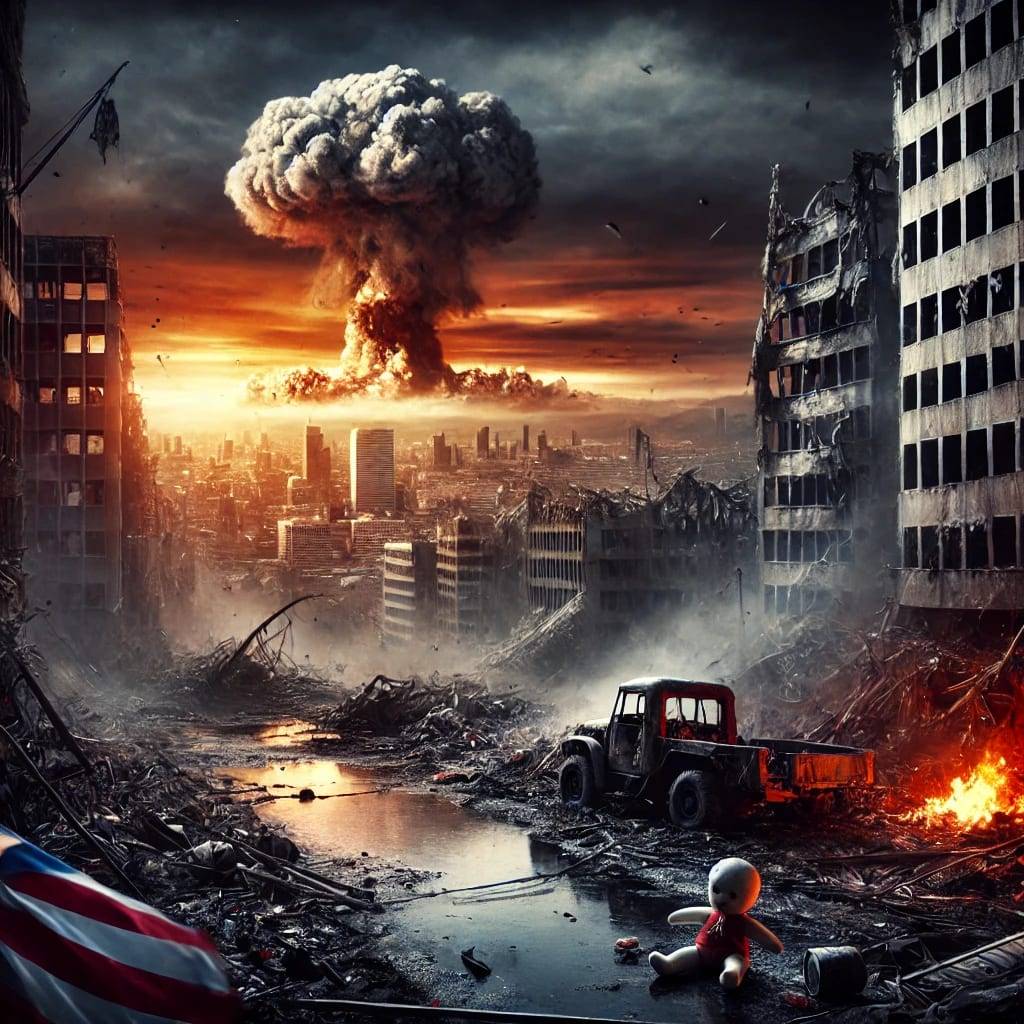The Devastating Impact of Nuclear War: A Future We Must Prevent
The world is really old, a tapestry of countless stories, civilizations, and cultures. Yet, throughout history, people have often chosen hate over love, division over unity. Humanity has fought wars over religion, land, and power, creating fractures between nations, races, and even colours. These divisions, born of prejudice and greed, have left scars on our collective existence. Perhaps the greatest tragedy of all is how, despite our shared humanity, we continue to tear each other apart.
The threat of nuclear war is the ultimate manifestation of this destructive path—a choice that could extinguish everything we’ve built and destroy the fragile balance of life on Earth.
Immediate Chaos: A World on Fire
Imagine a single nuclear bomb detonating over a densely populated city. Within seconds, the air ignites, buildings crumble, and millions of lives are lost. Survivors, if there are any, are left blinded, burned, and broken. The heat, equivalent to millions of suns, doesn’t discriminate. It erases everything: history, culture, and human connection.
Radiation, the silent killer, follows in the blast’s wake. It seeps into the soil, the water, and the air, poisoning all it touches. Survivors face illnesses their bodies can barely comprehend—acute radiation sickness, cancers, and genetic mutations that ripple through generations. These are not just statistics; they are parents, children, and friends whose futures are stolen in an instant.
The Long Shadow: Environmental Catastrophe
The impact of nuclear war extends far beyond the explosion zones. The smoke and ash from burning cities rise into the atmosphere, forming a dense layer that blocks sunlight. This “nuclear winter†plunges the planet into a chilling darkness. Crops wither, and food supplies dwindle. Starvation becomes the new enemy, claiming lives long after the bombs have fallen.
Our planet’s delicate balance—the very system that has nurtured life for millennia—would be shattered. The ozone layer, already fragile, would be stripped away, exposing life to dangerous levels of ultraviolet radiation. Even the rain, once a symbol of renewal, would carry death in its radioactive drops.
Humanitarian Collapse: A World in Crisis
For those who survive, the world becomes unrecognizable. Cities are uninhabitable, transformed into radioactive wastelands. Millions of displaced people wander in search of safety, their faces etched with fear and loss. Borders close, aid becomes scarce, and compassion turns to survival at any cost.
Perhaps this is the most harrowing truth of all: the collapse of humanity itself. Countries, divided by colors, religions, and ideologies, would face a grim reckoning. The wars we fought to assert dominance or prove superiority would no longer matter, for in the aftermath of nuclear devastation, there are no winners—only victims.
Economic Devastation: A Global Recession
The ripple effects of nuclear war would crush global economies. Cities—the beating hearts of trade, innovation, and culture—would be annihilated. Supply chains, already fragile, would disintegrate. Food, fuel, and basic necessities would become luxuries only the privileged could afford.
Markets would crash, and currencies would lose their value. The world, interconnected as it is, would feel the effects universally. From small villages to sprawling metropolises, no corner of the earth would remain untouched.
Loss of Biodiversity: A Dying Planet
The Earth’s ecosystems, so intricately connected, would unravel. Entire species would be wiped out, unable to adapt to the radioactive wastelands or the sudden climate shifts. Forests would burn, rivers would dry, and oceans would become toxic. Humanity’s relationship with nature—already strained—would reach a breaking point.
A Call to Humanity
It is easy to feel powerless in the face of such potential destruction. But history has shown that humanity is capable of great things. The treaties and agreements that exist today—the Non-Proliferation Treaty, disarmament efforts, and global peace initiatives—are proof that we can choose a different path.
Preventing nuclear war is not just the responsibility of governments; it is a collective duty. It begins with awareness and education, with understanding the stakes and refusing to look away. It requires ordinary people to demand accountability from leaders, to advocate for diplomacy, and to reject the normalization of weapons that could end our world.
Perhaps we can learn from our divisions—our wars, racism, and misplaced priorities—and realize that unity is our greatest strength. If we continue to fight over our differences rather than celebrating our shared humanity, we risk losing everything.
Conclusion: Hope in the Shadow
The threat of nuclear war is real, but so is the possibility of peace. Every action we take—every voice raised against this threat—brings us closer to a future where nuclear weapons exist only in history books. Let us honour those who have suffered in past conflicts by ensuring no one else has to endure their pain.
We owe it to ourselves, to future generations, and to the planet we call home. Perhaps the choice is not between nations or ideologies but between survival and extinction. What will we choose?


